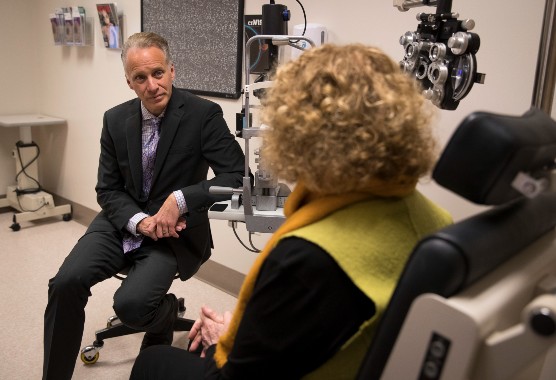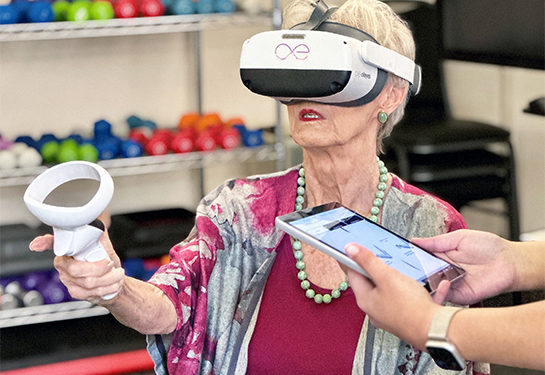Dry Eye
Dry eyes feel uncomfortable and interfere with daily life. Our ophthalmic specialists offer world-class care for dry eye disease.
Medically reviewed by Jeffrey Ma, M.D. on Aug. 07, 2024.

Expert Care for Dry Eye Disease
Your eyes can feel mildly to moderately irritated if you have dry eye disease (also called dry eye syndrome). The condition can leave you feeling frustrated and make some daily activities difficult.
Evaporative dry eye disease is the most common form of dry eye syndrome. When your tears do not contain enough oil, they evaporate too quickly to lubricate your eyes.
Aqueous tear deficiency is another form of dry eye disease. It occurs when your body doesn’t produce enough tears to keep your eyes lubricated.
Symptoms of Dry Eye Disease
The symptoms of dry eye can cause you to feel mild to moderate irritation. Symptoms can become very uncomfortable and interfere with daily activities if they are left untreated.
Common Symptoms
Signs you may have dry eye syndrome include:
- Blurred vision
- Burning or stinging
- Feeling like something is in your eye
- Itching
- Mucus or discharge from the eye
- Pain when you wear contact lenses
- Sensitivity to light
Causes of Dry Eye Syndrome
A variety of medical conditions, environmental issues or other factors cause dry eye disease.
Common causes include:
Allergies
Seasonal or environmental allergies (like pet dander) cause eye dryness and redness.
Autoimmune Disease
Autoimmune diseases like lupus, Sjogren's syndrome or rheumatoid arthritis can lead to dry eye syndrome.
Contact Lens Use
Contact lenses can block oxygen flow to your eyes. This leads to less tear production and possible tear film disorders.
Eyelid Disorders
Some eyelid disorders cause your eyelids to turn inward or outward. This can lead to dry eye disease.
Medications
Medicines like antidepressants, antihistamines, decongestants and oral contraceptives can reduce your tear production.
Meibomian Gland Dysfunction
Meibomian gland dysfunction is one of the most common causes of dry eyes. The oil glands in your eyelids do not produce enough oil, causing your tears to evaporate too quickly.
Risk Factors for Dry Eye Disease
Smoking
Smoking and exposure to second-hand smoke increase your risk of eye irritation and dryness.
Vitamin A and Omega-3 Deficiency
Low levels of vitamin A or Omega-3 fatty acids can contribute to dry eye syndrome.
Diagnosing Dry Eye
The cornea and external eye disease specialists at UC Davis Health Eye Center are known throughout the region for their expertise in managing dry eye disease.
Your provider will ask about your symptoms and medical history to diagnose dry eye. They will perform an eye exam to check:
- The consistency and amount of tears your eyes produce
- The health of your cornea and the inside of your eyelids
- The structure of your eyelids and your ability to blink
Treatments for Dry Eye at UC Davis Health
The UC Davis Health Eye Center team offers a wide range of treatment options for dry eye disease. We are dedicated to helping you protect and preserve your vision and the health of your eyes. Our treatments include:
Autologous Serum Eye Drops
Serum eye drops come from the patient’s own blood serum. They resemble natural tears and contain important biological factors that can help treat dry eye disease.
Eyelid Thermal Treatment (TearCare®):
TearCare is an eyelid thermal treatment that combines localized heat therapy with manual compression of the eyelids. It treats meibomian gland dysfunction and improves oil production.
Medicated Eye Drops
Your provider may prescribe eye drops that help your eyes increase tear production.
Ointment
Medicated ointment helps to reduce inflammation on the surface of your eyes.
Scleral contact lenses
Special contact lenses can help treat certain ocular surface diseases including dry eye disease.
Tear Duct Blocking
Small silicone plugs are placed in your tear ducts to slow your tears from draining. This helps your eyes retain more moisture and helps the tear film better lubricate your eyes.
Preventing Dry Eye Syndrome
Certain healthy lifestyle habits can help prevent you from developing dry eye.
These habits include:
- Applying artificial tears when your eyes feel dry
- Applying warm compresses (like a reheatable eye mask) to the eyelids every day to help promote healthy meibomian glands
- Eating foods high in vitamin A (like carrots) and Omega-3 fatty acids (like fish)
- Stopping smoking and avoiding second-hand smoke
- Using a humidifier in dry indoor environments
- Wearing sunglasses to prevent wind from drying your eyes
How common is dry eye disease?
16MPeople in the U.S. have a dry eye diagnosis
Prevalence in Women
70%Increased risk of dry eye disease for women
Source: Ophthalmology Times: Understanding Prevalence, Demographics of Dry Eye Disease
Request an Appointment
As Sacramento's No. 1 hospital, you'll benefit from unique advantages in primary care and specialty care. This includes prevention, diagnosis and treatment options from experts in 150 specialties.
Referring Physicians
To refer a patient, submit an electronic referral form or call.
800-4-UCDAVIS
Patients
Call to make an appointment.
Consumer Resource Center
800-2-UCDAVIS

Ranked among the nation’s best hospitals
A U.S. News & World Report best hospital in cardiology, heart & vascular surgery, diabetes & endocrinology, ENT, geriatrics, neurology & neurosurgery, and pulmonology & lung surgery.

Ranked among the nation’s best children’s hospitals
U.S. News & World Report ranked UC Davis Children’s Hospital among the best in pediatric nephrology, orthopedics*, and pulmonology & lung surgery. (*Together with Shriners Children’s Northern California)

Ranked Sacramento’s #1 hospital
Ranked Sacramento’s #1 hospital by U.S. News, and high-performing in aortic valve surgery, back surgery (spinal fusion), COPD, colon cancer surgery, diabetes, gynecological cancer surgery, heart arrhythmia, heart failure, kidney failure, leukemia, lymphoma & myeloma, lung cancer surgery, pacemaker implantation, pneumonia, prostate cancer surgery, stroke, TAVR, cancer, orthopedics, gastroenterology & GI surgery, and urology.

The nation’s highest nursing honor
UC Davis Medical Center has received Magnet® recognition, the nation’s highest honor for nursing excellence.

World-class cancer care
One of ~59 U.S. cancer centers designated “comprehensive” by the National Cancer Institute.

A leader in health care equality
For the 13th consecutive year, UC Davis Medical Center has been recognized as an LGBTQ+ Healthcare Equality Leader by the educational arm of America’s largest civil rights organization.

